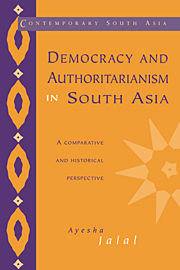Book contents
- Frontmatter
- Contents
- List of maps
- Preface
- Introduction
- 1 The colonial legacy in India and Pakistan
- 2 State formation and political processes in India and Pakistan, 1947 to c.1971
- 3 The ‘populist’ era and its aftermath in India, Pakistan and Bangladesh, 1971 to c.1993
- 4 The state and political economy, 1947 to c.1993
- 5 Central power and regional dissidence
- 6 Societies, cultures and ideologies: hybrids in contrived monoliths
- 7 Conclusion
- Bibliographical essay
- Index
7 - Conclusion
Published online by Cambridge University Press: 26 October 2009
- Frontmatter
- Contents
- List of maps
- Preface
- Introduction
- 1 The colonial legacy in India and Pakistan
- 2 State formation and political processes in India and Pakistan, 1947 to c.1971
- 3 The ‘populist’ era and its aftermath in India, Pakistan and Bangladesh, 1971 to c.1993
- 4 The state and political economy, 1947 to c.1993
- 5 Central power and regional dissidence
- 6 Societies, cultures and ideologies: hybrids in contrived monoliths
- 7 Conclusion
- Bibliographical essay
- Index
Summary
As to where Pakistan was located, the inmates knew nothing … the mad and the partially mad were unable to decide whether they were now in India or Pakistan. If they were in India where on earth was Pakistan … It was also possible that the entire subcontinent of India might become Pakistan. And who could say if both India and Pakistan might not entirely vanish from the map of the world one day?
The idea of the modern nation-state more than any other political construct has inspired a flourish of improbable social identities. Frontiers of states have rarely matched the complex contours of multiple identities. Demanding exclusive loyalty as the price of inclusion, the nation-state's definition of citizenship has rendered impermeable the otherwise historically shifting and overlapping boundaries of identities at the social base. Assertions of identity in the era of the modern nation-state are invariably expressions of a politics of difference which in diverse societies tend to translate into a politics of intolerance. Yet nowhere have the nation-state's ineluctable rules of citizenship generated more confusion and chaos than in a subcontinent dissected by the arbitrary lines of 1947. Amidst an unprecedented orgy of communal madness, only the inmates of a mental asylum in Sadaat Hasan Manto's short story, Toba Tek Singh, had the courage that comes of political innocence to question the insane logic of reducing identities to fit the ideologically based territorial limits of newly proclaimed ‘nation-states’.
- Type
- Chapter
- Information
- Democracy and Authoritarianism in South AsiaA Comparative and Historical Perspective, pp. 247 - 257Publisher: Cambridge University PressPrint publication year: 1995

